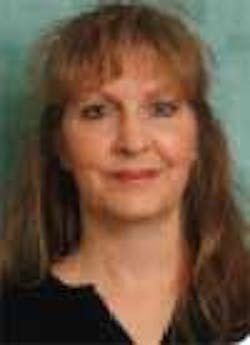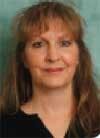Public Health Spotlight: Shari Peterson, RDH, MA
by Christine Nathe, RDH, MS
I realized a few weeks ago, that I always spotlight dental hygienists who have careers in public health. Makes sense, since this is a public health column. Interestingly though, these dental hygienists always seem to discuss their mentors who have influenced their career directions and endeavors. I immediately thought of a dental hygiene educator who is the epitome of a mentor for dental hygienists interested in the public health path. She has so much enthusiasm for community health and has educated hundreds of students about public health.
She serves on numerous state and national committees that focus on community oral health endeavors and continually strives to improve the dental care delivery system in Nevada. She has won the Student American Dental Hygienists" Faculty Advisor Award from the American Dental Hygienists" Association, the Southern Nevada Dental Hygienists" Association Outstanding Dental Hygienists" Award, and received a Letter of Commendation for Community Water Fluoridation from Dr. David Satcher, U.S. PHS Surgeon General. Recently, I asked Professor Shari Peterson, RDH, MEd, some questions.
Why did you decide to go into dental hygiene?
I was always interested in biological sciences, but my mother is the one who convinced me to seek a career in dental hygiene. My mother felt it was important to pursue a career that was flexible and would allow me to work my schedule around motherhood.
My mother had always taken me to dentists who did their own cleanings. When I was in high school, my mom worked as a dental receptionist and I enjoyed watching the dentist work, but dentistry as a profession didn"t interest me. When my mom left her job, she looked for another dentist closer to our home to take our family to for care. She decided on Dr. Robert Racine in Grass Valley, Calif. His wife, Rue, was his dental hygienist, and I have to credit her with inspiring me to pursue dental hygiene as a career. She let me sit chairside for an afternoon while she worked with her patients. I loved that she could provide care directly to the patients in her own operatory. I was really impressed with how she educated her patients. I loved how she connected with them on a personal level and made the appointments pleasant for the patients. All the cleanings I previously had were very rough, and she was gentle.
Watching her that day, I knew that I wanted to be just like her. She gave me the phone number for ADHA; I called and requested information and a list of programs. I was accepted at Idaho State University and headed to school with only $500 to my name. The program director, Denise Bowen, was fantastic with getting me set up with grants, loans, and scholarships. I would not have been able to go to school otherwise.
How did you get into educating hygienists about public health? Did you need additional education?
Well, I was always interested in teaching. My mother had taught elementary school too. After working for 10 years in private practice, I returned to college and obtained a master"s in education from the University of Nevada, Las Vegas. I thought that maybe someday I would pursue a teaching career in the future, but someone at the local dental hygiene school (College of Southern Nevada) found out I was working on my master"s and they asked if I would accept a part-time teaching position with them. A couple of years later, I applied for a full-time position in the program.
I became passionate about dental public health after being invited to participate in a prophy/sealant clinic for homeless children that was organized by my local dental hygiene component. It was a fantastic event, but I was frustrated with the lack of organized dental public health opportunities that existed in Nevada at that time. A friend, Cathy Lytle, kept me in the loop about opportunities to serve and help with the programs we did have. We worked together on many projects over the years. Chris Wood with the Nevada State Health Division also became a mentor to me on developing programs and grant writing. She helped me understand the intricacies of government and legislation.
I decided to combine both my passions for teaching and dental public health when I begged my program director to allow me to teach the community dental health courses in our program. I have taught community dental health to students for seven years. To enhance my teaching of the subject, I attended the very first Dental Public Health Educators Workshop at UNM in 2002 and was excited at how this venue was such a fantastic resource for learning how to teach dental public health. I have attended every year and was humbled to be asked to be a contributing speaker at the workshop for the last four years.
What are your current positions?
Currently, I am on a sabbatical leave from teaching to write a textbook on public health dental hygiene practice for hygienists who want to transition from working in private practice into the field of dental public health. Prior to my leave, I was the community outreach/community dental health course director and SADHA advisor at the College of Southern Nevada. I teach many of the public health track courses in our online baccalaureate completion program.
Can you discuss any particularly interesting experiences you have had in your dental public health and/or educational positions?
Wow, there are so many. Most of my inspiring experiences have happened as a result of being a member of ADHA and advocating returning public health dental hygiene back to the scope of practice for dental hygienists in my state. With these changes, dental hygienists are allowed to practice unsupervised in public health settings with a public health endorsement from our Board of Dental Examiners.
My most interesting and memorable experiences have occurred when working with our statewide dental sealant program. Most of the time we see rampant decay in the second grade children; however, this last year I have seen a dramatic drop in the amount of decay our children are experiencing. I believe this can be attributed to the combination of sealant placement and community water fluoridation that was established in Clark County around 2001. It is awesome to have visible results.
What advice would you give to a practicing hygienist who is thinking of doing something different?
I would say serve your community first. There is so much to offer in your own community. The feelings you get from helping others are incredible. The reality check of working in dental public health puts into focus the true nature of prevention that dental hygienists committed to when they pledged their oath. And service is free; giving of yourself has tremendous value to others. Pursuing a career in public health also increases your leadership abilities and your capacity for changing the profession to make it more beneficial for the public.
About the Author
Christine Nathe, RDH, MS, is a professor and graduate program director at the University of New Mexico, Division of Dental Hygiene, in Albuquerque, N.M. She is also the author of "Dental Public Health," (www.prenhall.com/nathe), which is in its second edition with Prentice Hall. She can be reached at [email protected] or (505) 272-8147.

